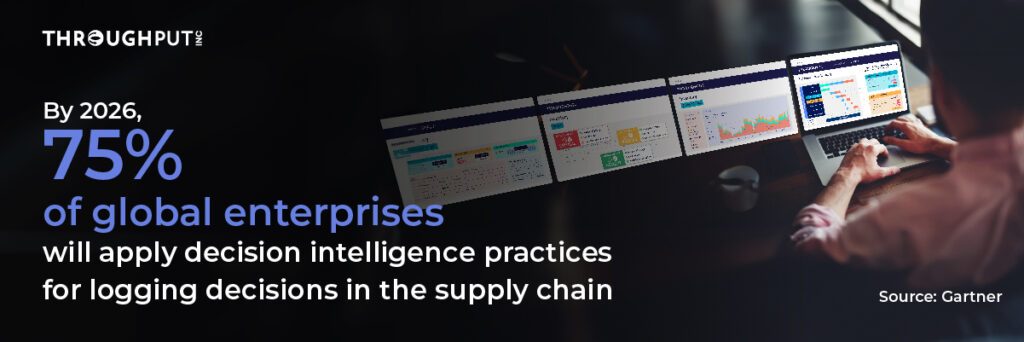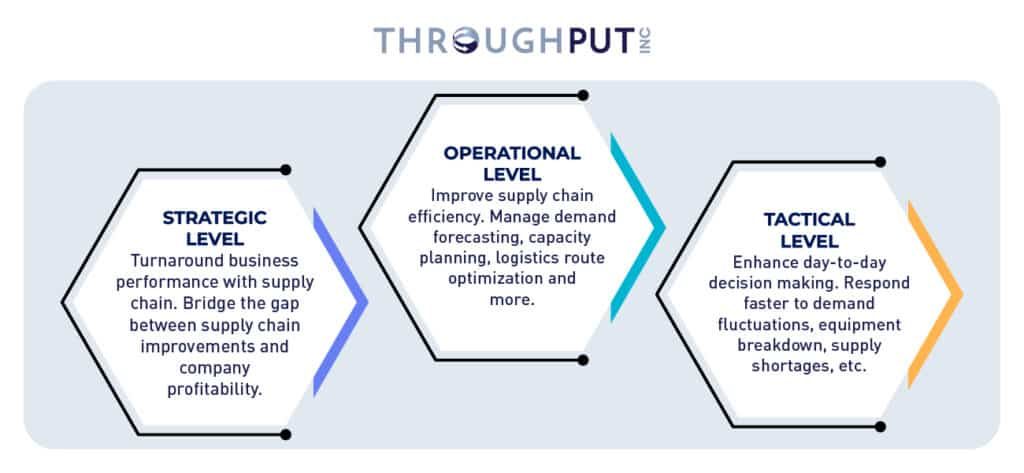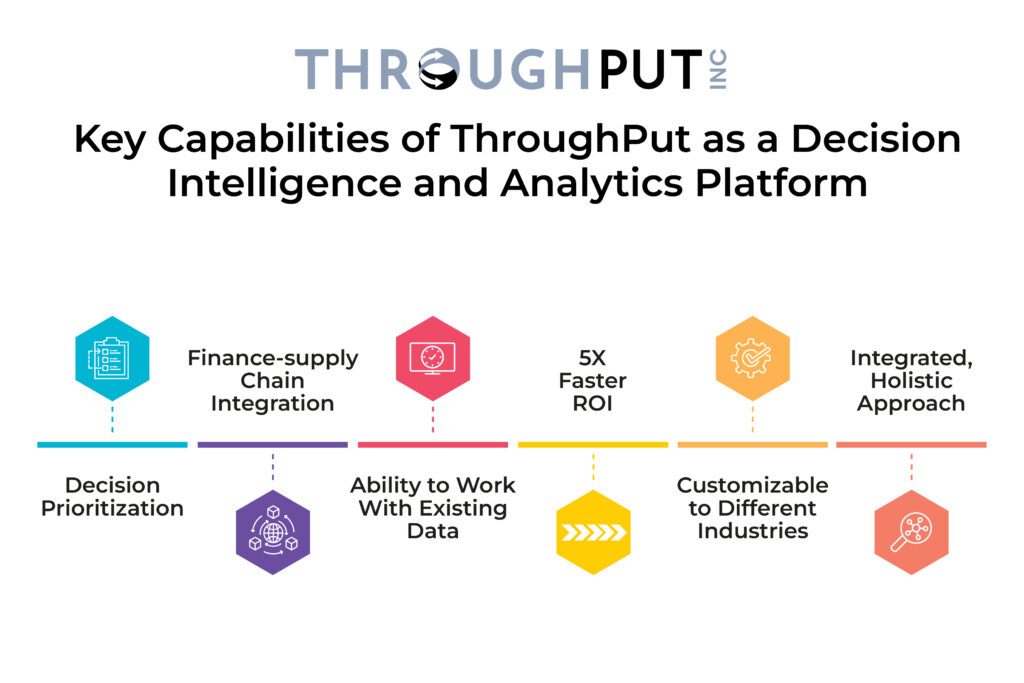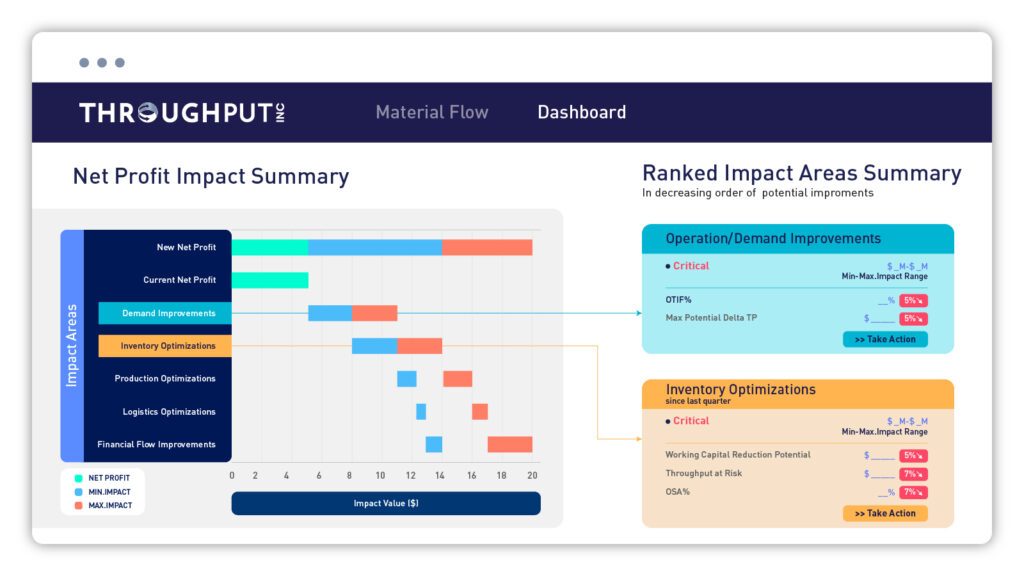ThroughPut AI in Review: Assessing Its Compatibility with Gartner’s Decision Intelligence and Analytics Platform Standards

When we talk about decision intelligence in supply chains, three big challenges inevitably emerge: they’re slow, too dependent on human judgment, and tend to operate in silos.
Even though there’s plenty of data out there, it’s still a pretty manual process to get the data ready and analyzed, which drastically slows decision making down. And more often than not, people still go with their gut feelings over what the data is telling them while cross-functional decision making is only still catching up.
This intuition-driven, sluggish approach to decision-making, barely sufficient before the pandemic, now falls short as market dynamics demand quicker, data-driven decisions.
This is exactly where the new wave of Analytics and Data Intelligence Platforms, highlighted by Gartner, comes into the picture. They’re stepping in to fill the gap, making it easier for supply chains to make decisions that are fast, contextualized, fact-based and timely, notes analysts Christian Titze, Noha Tohamy, David Pidsley and Leonard Ammerer in the June 2023 Market Guide for Analytics and Decision Intelligence Platforms in Supply Chain.

What Are Decision Intelligence and Analytics Platforms?
Analytics and Decision Intelligence (A&DI) platforms represent a significant leap forward in the realm of business intelligence. By integrating Artificial Intelligence (AI) and Machine Learning (ML), these platforms augment and automate decision-making processes within supply chains, making them not only faster but also grounded in data. This evolution allows for decisions to be continuously assessed and refined, paving the way for improved outcomes over time.
For those already using insights from dashboards to support decision-making, the value of such a platform is unmistakable.
In an environment where data inundates organizations constantly, manually parsing through this information to derive meaningful insights is no longer feasible. Traditional tools, while helpful, often leave a gap between gathering insights and implementing actionable strategies. Decision intelligence tools effectively close this gap, offering a seamless transition from insights to action.

This technology is not just about speed; it’s also about precision.
By automating the decision-making process, A&DI platforms ensure that decisions are not just made quickly but are also based on the most accurate and up-to-date information available. This capability is crucial in today’s fast-paced and uncertain environments, where the ability to respond rapidly and accurately to changing conditions can provide a competitive edge for supply chains.
Insights from Gartner’s Decision Intelligence and Analytics Platforms for Supply Chain Market Guide
Gartner’s June 2023 Market Guide for Analytics and Decision Intelligence Platforms in Supply Chain delivers a compelling forecast and comprehensive insights into the transformative power of decision intelligence within this sector.
According to Gartner, by 2026, an impressive 75% of global enterprises are expected to adopt decision intelligence practices for supply chain decision making. This significant shift underscores the growing recognition of decision intelligence as a critical tool for enhancing supply chain management.

In fact, the market guide serves as a vital resource for supply chain technology leaders, offering a deep dive into the evolution and future trajectory of decision intelligence. It highlights several key benefits of this technology:
- Accessibility for Non-technical Users: One of the standout features of decision intelligence is its user-friendly nature, allowing supply chain personnel without technical expertise to access and act on recommended actions. This democratization of data-driven decision-making significantly accelerates the pace at which decisions can be made, enhancing responsiveness and agility within the supply chain.
- Facilitation of Cross-Functional Decision-Making: Decision intelligence breaks down silos, enabling a more integrated approach to decision-making that spans across different functions of the supply chain. This cross-functional collaboration is crucial for aligning various parts of the organization towards common goals and strategies.
- Enhanced Decision Quality: The application of AI and Machine Learning (ML) within decision intelligence platforms elevates the quality of decision-making. AI facilitates the extraction of insights from near-real-time and expansive datasets, while ML enables the system to learn from past decisions, continuously improving the efficiency and accuracy of future decisions.
These advancements signify a paradigm shift in how decisions will be made within supply chains in the near future.
ThroughPut Named a Representative Vendor in Gartner’s Decision Intelligence and Analytics Market Guide
Gartner’s acknowledgment of ThroughPut as a representative vendor in the Analytics and Decision Intelligence category marks a significant recognition for the company.
ThroughPut has been at the forefront of bridging the critical gap between insights and actionable strategies within the supply chain sector, a major gap that most supply chain visibility tools don’t address.
This accolade underscores ThroughPut’s pivotal role in transforming how strategic, operational, and tactical decisions are made across supply chains.

By harnessing the capabilities of AI and Machine Learning (ML), ThroughPut employs prescriptive and cognitive analytics to pinpoint areas within the supply chain that offer the highest potential for improvement, ensuring maximum Return on Investment (ROI) in the shortest possible time.

Key Capabilities of ThroughPut as a Decision Intelligence and Analytics Platform
ThroughPut’s Decision Intelligence platform offers a robust set of key capabilities tailored to enhance supply chain operations and strategic decision-making. These capabilities focus on optimizing performance, efficiency, and return on investment:

1. Decision Prioritization
ThroughPut doesn’t just enable better decision making. It, in fact, helps identify and prioritize decisions based on their potential impact on the supply chain. This ensures that efforts and resources are focused on areas with the highest potential for improvement and value creation.
2. Finance-supply Chain Integration
One of the much loved features of ThroughPut is its financial view.
ThroughPut’s dashboard gives visibility into the impact of every supply chain decision on the profitability of the organization. Its recommendations also take into account the net financial impact of every decision.

3. Ability to Work With Existing Data
The platform is designed to seamlessly integrate with an organization’s existing data infrastructure. This capability allows for the utilization of current data assets without the need for extensive modifications or additional data collection efforts, facilitating a smoother implementation process.
Learn more about ThroughPut’s integration with SAP, Microsoft Dynamics 365, and project44.
4. 5X Faster ROI
ThroughPut promises a significantly accelerated return on investment, delivering outcomes five times faster than traditional methods. This rapid ROI is achieved through the platform’s efficient data analysis and decision prioritization.
5. Customizable to Different Industries
Recognizing the unique challenges and needs of different sectors, ThroughPut’s platform is highly customizable. It can be tailored to the specific requirements of various industries, ensuring that the insights and recommendations are relevant and directly applicable to each business’s context.
6. Integrated, Holistic Approach
ThroughPut adopts an integrated approach to decision intelligence, considering the entire supply chain ecosystem. This holistic perspective ensures that decisions are made with an understanding of their broader impacts, promoting alignment across various supply chain functions and ultimately leading to more coherent and effective strategies.
Application of Gartner’s Decision Intelligence and Analytics Platform in Supply Chain
Decision Intelligence (DI) platforms like ThroughPut revolutionize how businesses approach complex problems by leveraging data, analytics, and machine learning.
Here are some key use cases highlighting the transformative impact of decision intelligence in various operational areas:
1. Demand Segmentation
Decision intelligence enables businesses to categorize their market demand into distinct segments based on various criteria such as customer behavior, preferences, and purchasing patterns. This segmentation allows for more targeted production and logistics.
For instance, ThroughPut’s demand segmentation capability allows supply chains to identify customers and products with the maximum impact on revenue and prioritize them to improve customer satisfaction and loyalty. This, in turn, also optimizes capacity utilization and inventory management.
2. SKU Optimization
Through decision intelligence, companies can analyze sales data, customer preferences, and market trends to determine the optimal stock keeping unit (SKU) mix. This helps in managing inventory more efficiently, reducing stockouts and overstock situations, and ultimately improving profitability.
For example, a retail customer deployed ThroughPut’s SKU Optimization capabilities to identify high-value and high-demand products and deprioritized the production of low-value, low-demand products that ultimately, improved inventory management and product availability.
3. Spare Parts Replenishment
Decision intelligence tools predict the need for spare parts replenishment by analyzing usage patterns, failure rates, and supply chain lead times. This predictive capability ensures that parts are available when needed, minimizing downtime and maintaining operational efficiency.
ThroughPut has, for instance, been enabling spare parts replenishment for New York’s Metro-North Railroad and the US Airforce, among other customers.
4. Demand Sensing
Decision intelligence platforms use real-time data analytics to sense and predict changes in demand more accurately in the short term. This immediate insight allows businesses to adjust their production, inventory, and distribution strategies dynamically, reducing waste and increasing responsiveness to market changes.
ThroughPut’s demand sensing module comes handy in a highly volatile market where forecasting based on near-term trends is necessary. For instance, ThroughPut has been working with Church Brothers Farms, one of the leading agribusiness to improve forecasting and reduce product wastage leveraging AI.
5. Logistics Planning
Decision intelligence aids in optimizing logistics and transportation by analyzing routes, delivery schedules, and carrier performance. This results in more efficient use of resources, reduced transportation costs, and improved delivery times.
A cement manufacturer effectively optimized its yards per hour utilization to improve logistics performance and also reduce CO2 waste using ThroughPut’s logistics planning capabilities.
6. Capacity Optimization
By analyzing production data, demand forecasts, and operational constraints, decision intelligence platforms help businesses optimize their manufacturing capacity. This ensures that production is aligned with demand, maximizing resource utilization and minimizing bottlenecks.
7. Sales & Operations Planning (S&OP)
Decision intelligence enhances S&OP processes by providing a unified view of demand forecasts, inventory levels, supply chain constraints, and financial objectives. This integrated approach enables more effective collaboration, better decision-making, and a more agile response to market opportunities and risks.
Conclusion
Recognized by Gartner as a notable vendor in Analytics and Decision Intelligence, ThroughPut equips organizations to surmount the traditional hurdles of decision-making.
Our platform not only streamlines the decision-making process but also ensures that every decision is informed by accurate, up-to-date data, optimizing performance and efficiency across supply chain operations.
Engage with ThroughPut today to explore how our decision intelligence solutions can propel your organization forward in a competitive market landscape.

